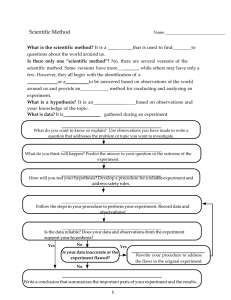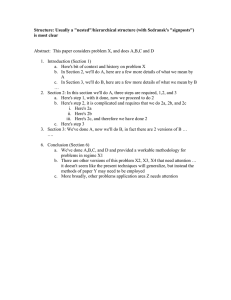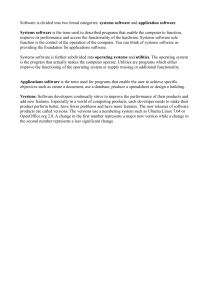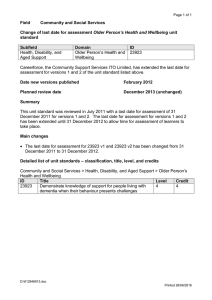Versions of eprints : understanding researchers` needs
advertisement
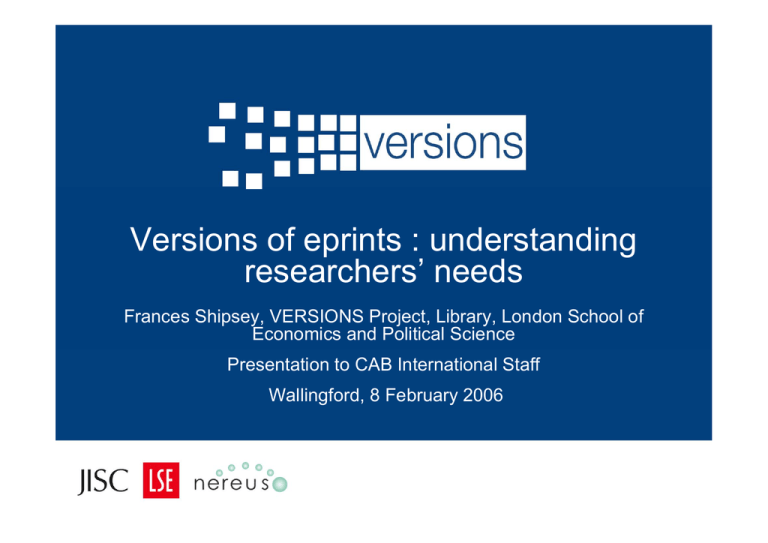
Versions of eprints : understanding researchers’ needs Frances Shipsey, VERSIONS Project, Library, London School of Economics and Political Science Presentation to CAB International Staff Wallingford, 8 February 2006 Outline • The Library of London School of Economics and Political Science • Digital repositories • Issues relating to versions in digital repositories • The VERSIONS Project • Other initiatives on versions • Managing versions in other contexts – examples of approaches • Possible approaches for versions of eprints Date/time/slide no. London School of Economics and Political Science – the Library Date/time/slide no. Redevelopment by Norman Foster Architects in 2001 Date/time/slide no. Open plan layout with clear sightlines Date/time/slide no. Concentration of study space and access to networked PCs Date/time/slide no. Printed collections All collections held at LSE in the Library recognised for their outstanding national and international importance and awarded 'Designation' status by the Museums Libraries and Archives Council (MLA) Date/time/slide no. Digital repositories • Open access principles – Budapest Open Access Initiative (BOAI) http://www.soros.org/openaccess/ • • • • • • Purpose of Budapest Meeting in 2001 to ‘accelerate progress in the international effort to make research articles in all academic fields freely available on the internet ‘ Institutional repositories Subject-based repositories Repositories based on type of content – theses, images, learning objects Directory of open access repositories OpenDOAR http://www.opendoar.org/ Gerard van Westrienen and Clifford Lynch. Academic Institutional Repositories : Deployment Status in 13 Nations as of Mid 2005. DLib Magazine 10 (9) September 2005 http://www.dlib.org/dlib/september05/westrienen/09westrienen.html Date/time/slide no. JISC Digital Repositories Programme • Joint Information Systems Committee • ‘JISC works with further and higher education by providing strategic guidance, advice and opportunities to use ICT to support teaching, learning, research and administration’ • Digital Repositories Programme builds on earlier programmes including FAIR (Focus on Access to Institutional Resources) • Digital Repositories Review informed call for proposals in 2005 • 21 Projects funded to start in 2005 – covering a range of issues • http://www.jisc.ac.uk/index.cfm?name=programme_digit al_repositories Date/time/slide no. Issues relating to versions • Copyright • • • • • generally cannot use publisher versions of PDFs, but see Cambridge University Press copyright assignment for journal articles is the norm major publishers allow authors to place ‘author final versions’ on personal websites or in institutional repositories – ROMEO listing at www.sherpa.ac.uk/romeo authors’ rights vary in different EU countries Availability of ‘final version’ – variations between latest author manuscript and published version – final corrections made by hand to publisher PDF proof Date/time/slide no. Issues … • Collaboration and co-authoring • • • • naturally leads to proliferation of internal ‘non-public’ draft versions when collaboration is inter-institutional may lead to proliferation of public versions – paper is placed in working paper series of each institution and on co-authors’ personal websites effort needed by all authors to keep versions in line with each other co-authors need to make efforts to obtain final version copies from the Corresponding Author Date/time/slide no. Issues … • Administration of different versions – objects and metadata • • • • authors may already be posting their papers in a number of different locations – personal website, departmental website or working paper series, subject-based working paper series, subject collections such as RePEc, university database of research outputs, and now institutional repositories keeping versions up to date in all of these locations is burdensome – authors may take pragmatic decision to update only personal website different versions of documents – single metadata record or separate role for libraries and repository managers – streamlining processes Date/time/slide no. Issues … • Informal communication and time lag in publication • • • 2-3 year wait for publication of journal article is common in economics Preprint and revised versions up to final author postprint are important phases in the scholarly communications cycle Impact/visibility and citations • • • Conference, workshop and seminar papers – important for disseminating work quickly and obtaining feedback – but hope for citation of working paper or journal article; hence abstract only conference proceedings Loss of impact if citations are dispersed between published article, working paper and postprint Evidence about the impact of open access articles as compared with non-OA articles. Stevan Harnad and Tim Brody. Comparing the Impact of Open Access (OA) vs. Non-OA Articles in the Same Journals. D-Lib Magazine, 9 (6) June 2004 Date/time/slide no. Issues … • Development of a unit of intellectual content • • • • • Herbert Van de Sompel (et al) (2004) Rethinking scholarly communication : building the system that scholars deserve, D-Lib 10 (9) – ‘Recording the dynamics of scholarship’ – relationships between different versions in the lifecycle of a paper are clear during the process, but difficult to recapture after the event How many versions to keep Role of corrections, comments and discussion in the lifecycle of a paper Journal article definitive and final version, but working papers and technical papers also definitive, can reach a final settled version and have a distinct existence in own right Quality issues - peer review • • • • Labelling different versions to indicate whether refereed, eg in eprints.org Peer review process – is a mark of quality Open access repositories aim to retain this mark Other quality indications are – track record of author – reputation of the authors’ institution Date/time/slide no. Issues … • Authors’ control over versions of research outputs • • • • Persistence • • • Placing a copy on personal website – authors retain (fairly) full control Posting a copy in a repository – who decides about removing earlier versions, authors, repository managers, or university administration Awareness that once posted on the web, papers cannot easily be withdrawn Pre-prints and postprints commonly cited – possible implications for cited author or citing author if the referenced work changes or disappears Revision vs persistence – a tension Digital objects but still mirroring print process • Multiple versions – not well linked to each other – still following model of print - snapshot PDF views of evolution of the paper Date/time/slide no. The VERSIONS Project • VERSIONS : Versions of Eprints – user Requirements Study and Investigation of the Need for Standards • Funded by the Joint Information Systems Committee (JISC) under the Digital Repositories Programme • London School of Economics and Political Science (LSE) - lead partner • Nereus – consortium of European research libraries specialising in economics – associate partner • July 2005 to January 2007 Date/time/slide no. A library network Date/time/slide no. Aims of the VERSIONS Project • to clarify the position on different versions of academic papers in economics available for deposit in digital repositories, in order to help build trust among academic users of repository content • to produce a toolkit of guidelines about versions for authors, researchers, librarians and others engaged in maintaining digital repositories • to propose standards on versions to JISC to inform discussions and negotiations with stakeholders Date/time/slide no. Focus of the project • Economics • • • Established pattern of using preprints Importance of journals coupled with long lead times for publication Builds on existing experience and partnerships • Eprints • • Builds on experience of other projects and programmes Not looking at data or other object types • Europe • • Cultural and IPR differences worth investigating Builds on existing experience and partnerships Date/time/slide no. Approach of the VERSIONS Project • User requirements study • • • Talking to authors, researchers, librarians, repository software developers, relevant standards communities, and other stakeholders Attitudes and current practice Interviews, online survey and evaluation of user study • Publications lists analysis • Analysis of publications lists of 70 economists in Economists Online repository, looking at availability of full text – By date of publication – By country – By publisher/self-archiving policy – Location of full text copy Date/time/slide no. Guidelines and standards • • • • Reaching consensus with stakeholders Development of guidelines on good practice Production of a toolkit for researchers Recommendation of standards Date/time/slide no. Interviews • Interviews held during October 2005 to February 2006 • Held at • • • • • • • KU Leuven, Belgium Universite Libre de Bruxelles, Belgium WU-Wien, Austria Maastricht, Netherlands ZBW-Kiel, Germany LSE, UK Interviewees • • • • • • Professors Lecturers PhD students Library staff Secondary publisher Research information service staff Date/time/slide no. Initial results from interviews • Authors retain many versions of their work • Most of these are not seen as public versions • May actively seek to keep some versions out of the public domain or to control their use • • • Very early drafts circulated between co-authors Results that are early or tentative (conference presentations) Evidence of rejected journal submissions • Delay in publication of peer-reviewed articles contributes to the use of other dissemination outlets Date/time/slide no. Initial results from interviews • • • • • Posting papers in multiple locations – administrative effort to update in each location Collaboration with co-authors requires additional effort to manage versions Use of date is crucial; simple way to identify latest version of others’ work would be excellent – a ‘non-obvious task’ at present Essential to be able to identify the definitive versions versions and to point to journal article for citations As authors citing others’ work in publications • • • • Adds weight to argument through citing published articles rather than work in progress Administrative burden of checking citations when article is submitted and again after acceptance Trade-off between wide dissemination and control over versions As readers – finding broken links in articles is problematic Date/time/slide no. Other initiatives on versions • NISO/ALPSP Working Group on Versions of Journal Articles • • • • Policy paper from February 2005 by Sally Morris Two groups – technical working group and review group Developing use cases http://www.niso.org/committees/Journal_versioning/JournalVer_com m.html • JISC scoping study • RIVER : Scoping Study on Repository Version Identification, commissioned by the JISC Scholarly Communications Group – to report in March 2006. Lead partner: Rightscom Ltd. Partners Library of LSE and Oxford University Computing Services Date/time/slide no. Versions in other contexts • Literary criticism • • • Shakespeare – quarto and folio editions Textual transmission Variorum editions have existed in the print age – new initiatives to produce electronic variorum editions • Software development • • • Concurrent versioning systems used by developers Release numbering systems Divergence of software – local customisation by or for clients • Continuous updating • • A problem in print environment, eg legal encyclopedia looseleaf publications – earlier versions lost A solution in the fully digital environment? - earlier versions can be retained and compared – Cf Wikipedia Date/time/slide no. Possible approaches • Labelling • • • Describing • • • • MARC21 Linking entry fields (76X-78X) IFLA Functional Requirements for Bibliographic Records (FRBR) Dublin Core element - relation Dublin Core refinements – hasVersion, isVersionOf Comparing text • • • Author annotations and free-text descriptions in metadata Date Cover sheets – standard template Linking • • • • • Reach consensus on terminology – naming conventions Numbering systems, cf software release Formats Tools Signposting • • To published journal version (for citations) To author-approved latest version of pre-print (for full elaboration of argument, proof, supporting data) Date/time/slide no. Consultation • The VERSIONS Project is seeking views and opinions on handling of multiple versions from: • • • • • • researchers and authors software developers metadata community librarians publishers university research information staff • Comments and views welcome Date/time/slide no. Contacts • VERSIONS Project • • versions@lse.ac.uk www.lse.ac.uk/versions • The Library at LSE • www.lse.ac.uk/library • Nereus • www.nereus4economics.info • JISC Digital Repositories Programme • http://www.jisc.ac.uk/index.cfm?name=programme_digital_repositori es Date/time/slide no.
